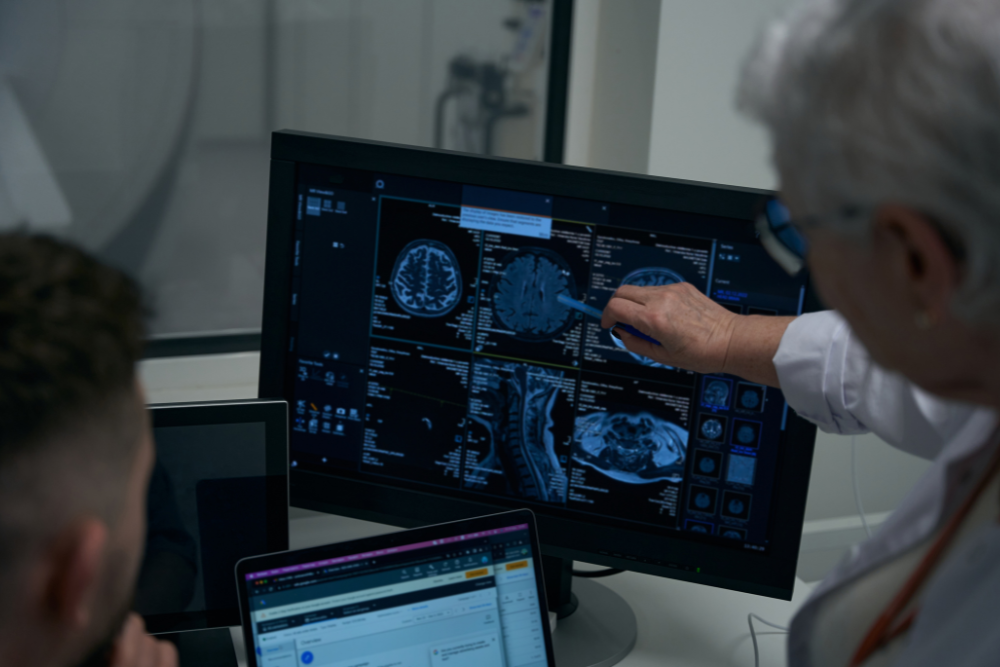Our Specialized Exams
A neurological exam is a vital tool in assessing the health of an individual’s nervous system. This examination evaluates motor and sensory skills, mental status, balance, coordination, reflexes, and nerve functionality. Our team can conduct these exams either in-person at our office or remotely via secure telecommunication platforms. While a fight doctor can perform basic neurological evaluations remotely, more in-depth testing may be necessary if signs of damage or impairment are detected during the initial assessment.
Neurological exams are often required by state commissions as part of pre-fight medical clearance. Even outside of these mandates, fighters should undergo these evaluations if they experience symptoms suggesting potential nerve damage. Post-fight complaints that may warrant a neurological exam include blurry vision, headaches, behavioral changes, fatigue, tingling or numbness in extremities, impaired movement, balance issues, seizures, fever, tremors, weakness, or slurred speech. Identifying and addressing these concerns early can significantly reduce the risk of long-term complications.
Neurological Test Components
Balance and Motor Function
To evaluate balance, the individual might be asked to stand with their eyes closed while gently pushed from the side or perform specific movements like walking in a straight line. Motor function tests involve exercises where the patient pushes or pulls against the examiner’s resistance using their arms or legs.
Mental Status
This test checks the fighter’s awareness and understanding of their environment. Questions about location, time, and recent events help assess cognitive function, while the clarity and rationality of speech are also observed.
Coordination Exam
A physician may ask the fighter to perform tasks such as touching their nose with their eyes closed, tapping fingers or feet rapidly, or walking along a straight line to evaluate coordination.
Cranial Nerve Evaluation
This segment of the exam focuses on key brain nerves:
- Optic Nerve (vision): Tested using a light to assess vision clarity.
- Oculomotor, Abducens, and Trochlear Nerves (eye movement): Eye tracking is observed as the patient follows a moving light.
- Trigeminal Nerve (face sensation and chewing): Assessed by touching areas of the face and observing chewing movements.
- Facial Nerve (expression and taste): Evaluated through facial movements like smiling or tasting specific substances.
- Acoustic Nerve (hearing): General hearing tests are conducted.
- Accessory Nerve (neck and shoulder movement): Assessed by asking the patient to shrug or turn their head against resistance.
- Hypoglossal Nerve (tongue movement): The fighter may stick out their tongue or speak to evaluate functionality.
MRI Scan Review with Report
Magnetic Resonance Imaging (MRI) is a detailed radiology technique used to examine the brain, spinal cord, and other parts of the body. It is instrumental in identifying issues such as tumors, swelling, bleeding, or inflammation caused by injuries. A fight doctor can schedule an MRI for you and provide a thorough report after reviewing the results.
Preparing for an MRI
Unless instructed otherwise, you can typically eat and drink before the scan. However, some cases may require fasting for up to four hours. You must remove all metal objects from your person, including jewelry, piercings, and dentures, to prevent interference with the magnetic field.
The MRI procedure involves lying on a motorized bed that moves into a cylindrical scanner. The process is painless, though you will need to stay still to ensure accurate imaging. Some scans may involve a contrast dye injection to enhance visibility of certain tissues.
CT Scan Review with Report
Computer Tomography (CT) scans use X-rays to create cross-sectional images of the body. While less detailed than MRIs, CT scans are effective for diagnosing bone injuries, cancer, and lung issues.
Both MRI and CT scans are essential tools for evaluating injuries and abnormalities. By reviewing the results, our fight doctors can provide detailed reports, recommend treatments, or refer you to specialists, ensuring you are fully prepared for competition.


